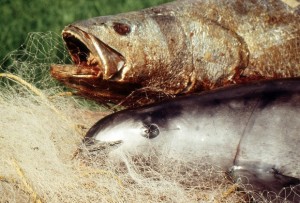US calls for talks with Mexico on endangered porpoise

FILE PHOTO: This 1992 photo released by Omar Vidal shows a dead totoaba, top, and a vaquita marina after they were caught in gillnet, set by fishermen to catch totoaba fish in the El Golfo de Santa Clara, in the northern part of Mexico’s Sea of Cortez. Scientists are warning that the population of Mexico’s endangered vaquita marina, the world’s smallest porpoise, has fallen to alarmingly low levels and is heading toward extinction soon if drastic measures aren’t taken. INQUIRER FILES
Washington, United States — Washington has invoked the environmental provisions of the North American free trade pact to urge Mexico to do more to protect the critically endangered vaquita porpoise, officials announced Thursday.
The office of the US Trade Representative (USTR) said it is requesting consultations with Mexico under the Environment Chapter of the United States-Mexico-Canada Agreement, or USMCA.
While Mexico last year put in place measures to protect the world’s most endangered marine mammal, there is evidence it is not meeting its commitments under the pact, USTR said in a statement.
“USTR is committed to protecting the environment and is requesting this consultation to ensure Mexico lives up to its USMCA environment commitments,” US Trade Representative (USTR) Katherine Tai said. “We look forward to working with Mexico to address these issues.”
It is the first time a government has invoked the environmental provisions of the trade pact, which took effect in July 2020.
The vaquita is endemic to the Upper Gulf of California in Mexico, with at least six but likely fewer than 19 remaining, the statement said, noting that it is threatened largely by illegal gillnets used to catch shrimp and totoaba.
However, “scientists maintain that the species continues to be biologically viable, if given the space to recover.”
The consultations also cover illegal fishing of the totoaba.
Deputy USTR Jayme White told reporters Washington has “serious concerns about Mexico’s enforcement of its environmental laws,” and the talks will focus on finding “a durable solution.”
Under USMCA, consultations should be scheduled within 30 days, and at least 75 days must pass before Washington can escalate a dispute to the next level.
Without a resolution, it could lead to the imposition of tariffs but senior USTR officials cautioned that it is premature to discuss any punitive actions.
Mexico’s economy ministry said it would coordinate work between authorities from the two countries to present “the efforts and measures adopted to protect marine species” in Mexican waters.
“The government of Mexico reaffirms its commitment to the correct implementation of USMCA and the responsibilities assumed under it,” it said in a statement.
RELATED STORY
Mexico hopes fish farming can help save endangered porpoise
Efforts to save Mexico’s endangered porpoise end